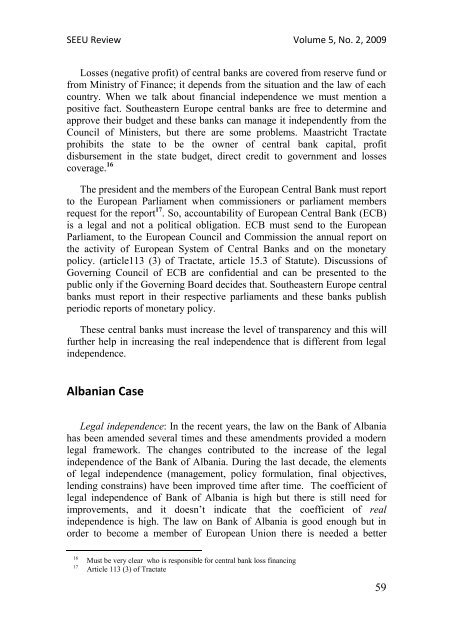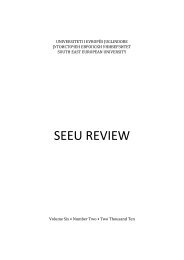SEEU Review vol. 5 Nr. 2 (pdf) - South East European University
SEEU Review vol. 5 Nr. 2 (pdf) - South East European University
SEEU Review vol. 5 Nr. 2 (pdf) - South East European University
Create successful ePaper yourself
Turn your PDF publications into a flip-book with our unique Google optimized e-Paper software.
<strong>SEEU</strong> <strong>Review</strong> Volume 5, No. 2, 2009<br />
Losses (negative profit) of central banks are covered from reserve fund or<br />
from Ministry of Finance; it depends from the situation and the law of each<br />
country. When we talk about financial independence we must mention a<br />
positive fact. <strong>South</strong>eastern Europe central banks are free to determine and<br />
approve their budget and these banks can manage it independently from the<br />
Council of Ministers, but there are some problems. Maastricht Tractate<br />
prohibits the state to be the owner of central bank capital, profit<br />
disbursement in the state budget, direct credit to government and losses<br />
coverage. 16<br />
The president and the members of the <strong>European</strong> Central Bank must report<br />
to the <strong>European</strong> Parliament when commissioners or parliament members<br />
request for the report 17 . So, accountability of <strong>European</strong> Central Bank (ECB)<br />
is a legal and not a political obligation. ECB must send to the <strong>European</strong><br />
Parliament, to the <strong>European</strong> Council and Commission the annual report on<br />
the activity of <strong>European</strong> System of Central Banks and on the monetary<br />
policy. (article113 (3) of Tractate, article 15.3 of Statute). Discussions of<br />
Governing Council of ECB are confidential and can be presented to the<br />
public only if the Governing Board decides that. <strong>South</strong>eastern Europe central<br />
banks must report in their respective parliaments and these banks publish<br />
periodic reports of monetary policy.<br />
These central banks must increase the level of transparency and this will<br />
further help in increasing the real independence that is different from legal<br />
independence.<br />
Albanian Case<br />
Legal independence: In the recent years, the law on the Bank of Albania<br />
has been amended several times and these amendments provided a modern<br />
legal framework. The changes contributed to the increase of the legal<br />
independence of the Bank of Albania. During the last decade, the elements<br />
of legal independence (management, policy formulation, final objectives,<br />
lending constrains) have been improved time after time. The coefficient of<br />
legal independence of Bank of Albania is high but there is still need for<br />
improvements, and it doesn’t indicate that the coefficient of real<br />
independence is high. The law on Bank of Albania is good enough but in<br />
order to become a member of <strong>European</strong> Union there is needed a better<br />
16<br />
17<br />
Must be very clear who is responsible for central bank loss financing<br />
Article 113 (3) of Tractate<br />
59

















